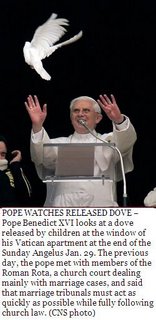Cindy Wooden
CNS
CNS
VATICAN CITY (CNS) -- For the good of individuals and the Catholic Church as a whole, marriage tribunals must act as quickly as possible while fully following church law, Pope Benedict XVI said.
 "For more than a few of the faithful," he said, "ecclesiastical sentences in this area, in fact, have an impact on the possibility or not of receiving Communion."
"For more than a few of the faithful," he said, "ecclesiastical sentences in this area, in fact, have an impact on the possibility or not of receiving Communion."
Pope Benedict met Jan. 28 with members of the Roman Rota, a church court dealing mainly with marriage cases.
A tribunal declaration that a marriage was invalid would allow a divorced and civilly remarried couple to have their union recognized by the church and, therefore, to receive Communion.
Pope Benedict said the reason why so many bishops at the October synod on the Eucharist raised questions about tribunals and annulment procedures was precisely because receiving the Eucharist is so important.
At times, the pope said, it can appear that pastoral concern for people in irregular marriage situations clashes head-on with the church's insistence that matrimony is forever and that annulments may be granted only when there is clear proof that the conditions for a valid marriage did not exist from the beginning.
"The fundamental point of encounter between law and pastoral concern," the pope said, is "love for the truth."
The pastoral value of an annulment "cannot be separated from love for the truth," he said.
The purpose of an annulment procedure "is not to uselessly complicate the lives of the faithful nor even less to exacerbate litigiousness, but only to serve the truth," Pope Benedict said.
The pope also said a husband and wife who have separated cannot self-declare their marriage invalid because marriage is a sacrament of the church and a good for society.
Reason dictates that an impartial third party be asked to examine the facts and make a judgment, he said.
At the same time, the search for truth in a marriage case is very concrete and has a deep impact on the individuals involved, the pope said. Because it touches both their human and Christian development, "it is very important that the declaration arrive in a reasonable amount of time," the pope said.
Pope Benedict said it also was very important that the church's pastoral approach to couples be evident long before any troubles arise. From the moment a couple requests to be married in a Catholic Church, priests must work to ensure that the couple understands the meaning of the sacrament of matrimony, he said.
And at the first sign of trouble between a husband and wife, he said, they must be offered assistance in resolving their differences and finding "the path of reconciliation."
 "For more than a few of the faithful," he said, "ecclesiastical sentences in this area, in fact, have an impact on the possibility or not of receiving Communion."
"For more than a few of the faithful," he said, "ecclesiastical sentences in this area, in fact, have an impact on the possibility or not of receiving Communion."Pope Benedict met Jan. 28 with members of the Roman Rota, a church court dealing mainly with marriage cases.
A tribunal declaration that a marriage was invalid would allow a divorced and civilly remarried couple to have their union recognized by the church and, therefore, to receive Communion.
Pope Benedict said the reason why so many bishops at the October synod on the Eucharist raised questions about tribunals and annulment procedures was precisely because receiving the Eucharist is so important.
At times, the pope said, it can appear that pastoral concern for people in irregular marriage situations clashes head-on with the church's insistence that matrimony is forever and that annulments may be granted only when there is clear proof that the conditions for a valid marriage did not exist from the beginning.
"The fundamental point of encounter between law and pastoral concern," the pope said, is "love for the truth."
The pastoral value of an annulment "cannot be separated from love for the truth," he said.
The purpose of an annulment procedure "is not to uselessly complicate the lives of the faithful nor even less to exacerbate litigiousness, but only to serve the truth," Pope Benedict said.
The pope also said a husband and wife who have separated cannot self-declare their marriage invalid because marriage is a sacrament of the church and a good for society.
Reason dictates that an impartial third party be asked to examine the facts and make a judgment, he said.
At the same time, the search for truth in a marriage case is very concrete and has a deep impact on the individuals involved, the pope said. Because it touches both their human and Christian development, "it is very important that the declaration arrive in a reasonable amount of time," the pope said.
Pope Benedict said it also was very important that the church's pastoral approach to couples be evident long before any troubles arise. From the moment a couple requests to be married in a Catholic Church, priests must work to ensure that the couple understands the meaning of the sacrament of matrimony, he said.
And at the first sign of trouble between a husband and wife, he said, they must be offered assistance in resolving their differences and finding "the path of reconciliation."
- Copyright (c) 2006 Catholic News Service/U.S. Conference of Catholic Bishops

No comments:
Post a Comment